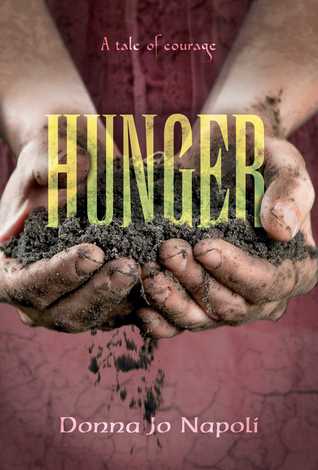 Napoli, Donna Jo. Hunger: A Tale of Courage
Napoli, Donna Jo. Hunger: A Tale of CourageFebruary 13th 2018 by Simon Schuster/Paula Wiseman Books
E ARC from Edelweiss Plus
The Irish Potato Famine was more devastating than young readers today can imagine. Told from the point of view of Lorraine, a girl whose father is a tenant farmer near Galway in 1846, we see just how horrific the lack of a major crop can be to a community already struggling under British rule. Lorraine's parents and young brother, Paddy, struggle mightily, eating soup made of local vegetation and keep warm at night only by snuggling next to their pig. Clothing and blankets are so hard to come by that when a father and his three children beg for meals from Lorraine's mother, the children are naked. This family is later found dead next to the side of the road, victims of fever. This fever spreads to a family who helped them, and only the father survives. When Lorraine makes the acquaintance of the young mistress whose father owns the land, she sees just how much better off the British are, and convinces Miss Susannah that things are as bad as she has heard. With Susannah's help, Lorraine takes eggs back to her small community, and this bolsters everyone's health a tiny bit. Families make plans to leave after crops fail for another year, but Susannah's family decides to stay put after tragedy affects them. Luckily for Lorraine, her friend Emmet stays behind, and the two use all of their skills and wiles to keep the family fed.
Strengths: Naploi always does a fantastic job of researching her stories; I was a tiny bit surprised that this wasn't somehow tied into a fairy tale, like much of her other work. The details of the potato blight, daily life, and the intricacies of how to survive under such horrible circumstances are all brilliant. Lorraine is a great character, and Susannah is realistically unmoved for most of the book, although she does come around a bit. Emmett was also a good addition, and the absence of romance is realistic, although we are left believing that there might be one if things ever improved. Even though this book really left me very sad (not the thing I needed over a frigid winter break!), even that is a testament to the effectiveness of Napoli's writing. Would definitely purchase for a high school or a public library.
Weaknesses: I wish there had been a clearer plot to move things along when it was super sad which, given the topic, it was all the time. A small element of hope would have helped.
What I really think: Even though I can get about two students a year to check out Susan Campbell Bartoletti's 2001 Black potatoes : the story of the great Irish famine, 1845-1850, I weeded Giff's Nory Ryan's Song a couple of years ago because no one ever checked it out. As much as I adore Napoli's work, I think I will pass on purchasing, although now I kind of wish I had kept the Giff title.

No comments:
Post a Comment